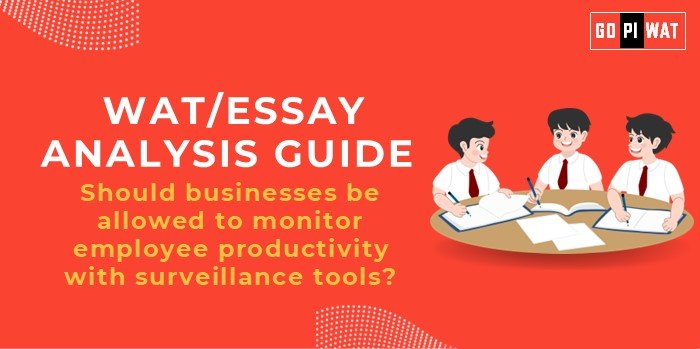📋 WAT Analysis Guide
🌐 Topic: Should businesses be allowed to monitor employee productivity with surveillance tools?
💡 Understanding the Topic’s Importance
This essay topic reflects the tension between operational efficiency and employee rights, a critical issue for future managers and business leaders. It highlights themes like technology ethics, trust, and data privacy—important in both corporate and social contexts.
⏳ Effective Planning and Writing
Time Allocation:
- 🕒 Planning: 5 minutes
- ✍️ Writing: 20 minutes
- 🔍 Review: 5 minutes
📄 Introduction Techniques for Essays
- Template A: Contrast Approach: “While businesses report a 30% productivity boost from using surveillance tools, 73% of employees claim constant monitoring increases stress and distrust. This highlights the need to reassess the fine balance between efficiency and employee autonomy.”
- Template B: Problem-Solution Approach: “With increasing remote work adoption, businesses face challenges in monitoring employee productivity. However, the ethical use of surveillance tools, ensuring privacy and transparency, can resolve this debate.”
📊 Structuring the Essay Body
- Paragraph 1: Achievements of Surveillance Tools
- Improved Productivity: Companies report measurable gains.
- Performance Analysis: Data-driven reviews improve evaluations.
- Fraud Reduction: Monitors misuse of work hours.
- Paragraph 2: Challenges and Ethical Concerns
- Employee stress and loss of autonomy.
- Legal and regulatory hurdles (e.g., GDPR in the EU).
- Ethical debates on surveillance limits.
- Paragraph 3: Future Outlook
- Recommendations for ethical use: transparency, partial tracking with consent.
- Adoption of AI-driven tools for fair analysis.
🔍 Concluding Effectively
- Balanced Approach: “While productivity monitoring tools can enhance efficiency, businesses must adopt ethical practices with transparency and respect for employee privacy.”
- Future-Focused Approach: “Employee surveillance must evolve to balance productivity gains with trust and well-being, ensuring long-term organizational success.”
📈 Analyzing Successes and Shortcomings
- Key Achievements: Measurable productivity improvements, enhanced performance evaluations.
- Ongoing Challenges: Ethical concerns and privacy violations, stress and morale erosion among employees.
- Global Context:
- EU: GDPR laws restrict monitoring without consent.
- China: Productivity focus often overrides employee privacy.
✨ Recommendations for Sustainable Progress
- 📜 Implement ethical frameworks: Use partial surveillance with clear guidelines.
- 🤝 Ensure employee consent and transparency: Build trust through open communication.
- 🧠 Use AI-based systems: Enable unbiased, productivity-focused tracking.
✍️ Sample Short Essays
- Balanced Perspective: “While surveillance tools help companies track productivity, they risk violating employee privacy and increasing stress. Ethical frameworks, transparency, and employee consent are essential for sustainable implementation. Companies must focus on trust-based strategies that combine performance tracking with respect for autonomy to ensure long-term success.”
- Solution-Oriented: “With rising remote work, businesses require surveillance tools to monitor productivity. However, the solution lies in ethical monitoring. Transparency, AI-driven tools, and consent-based frameworks can balance efficiency and privacy. Companies adopting such practices can optimize productivity without eroding employee trust.”
- Global Comparison: “Countries like the US and EU approach employee monitoring differently, balancing productivity with privacy laws. While businesses benefit from tracking tools, excessive monitoring, as seen in parts of Asia, raises ethical concerns. To align with global standards, companies must implement transparent and consent-driven monitoring strategies.”


